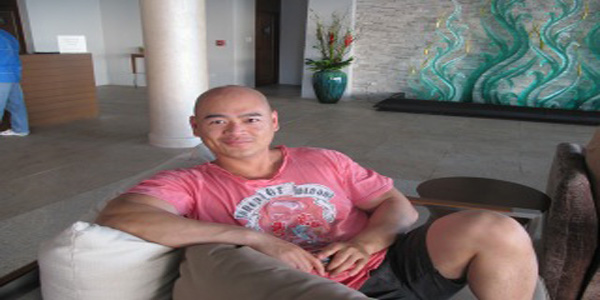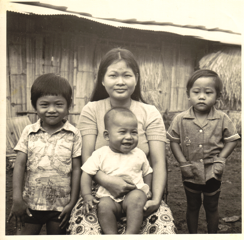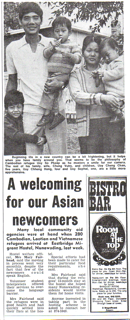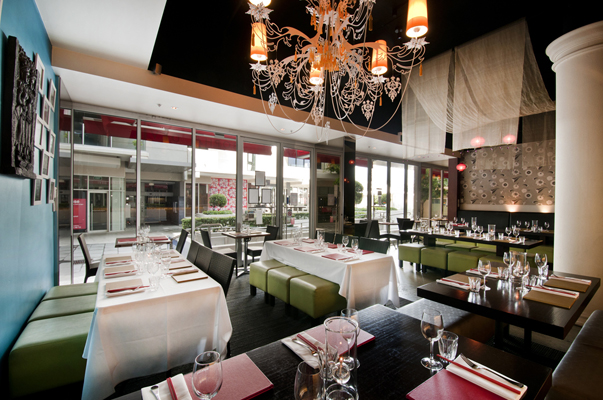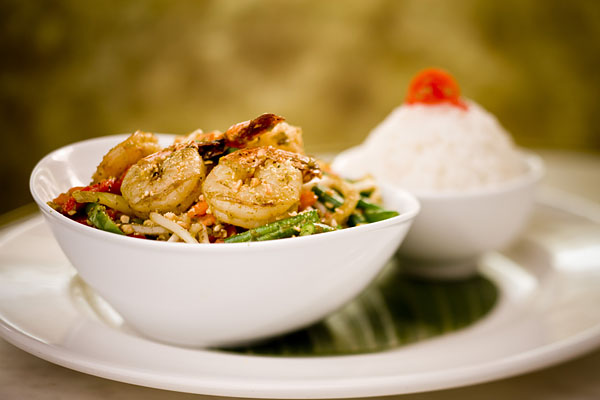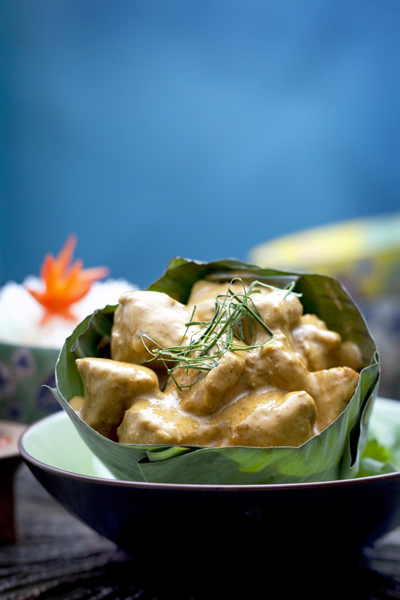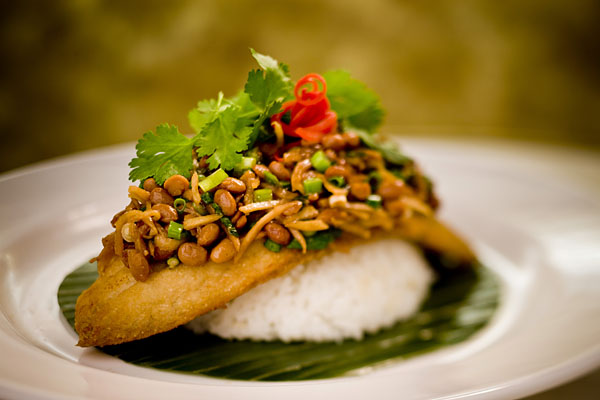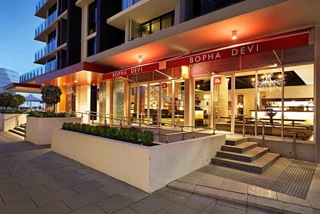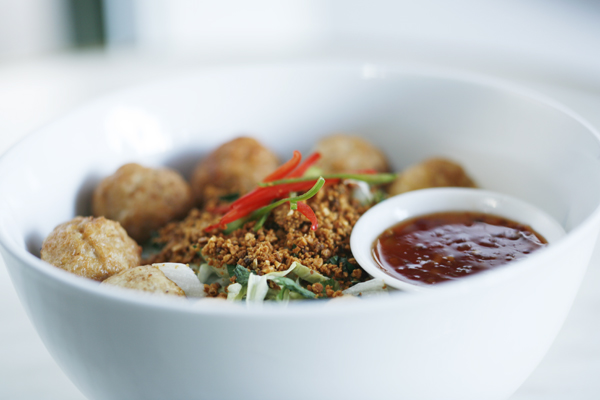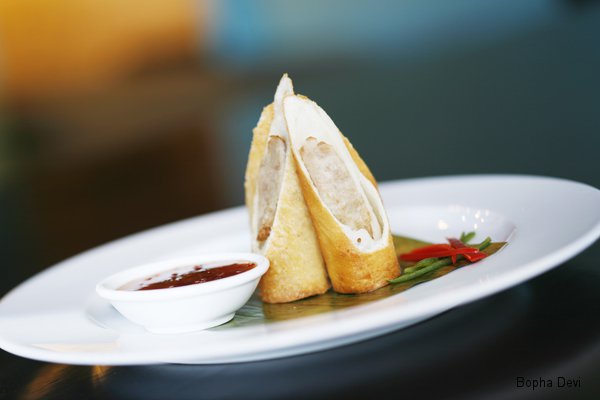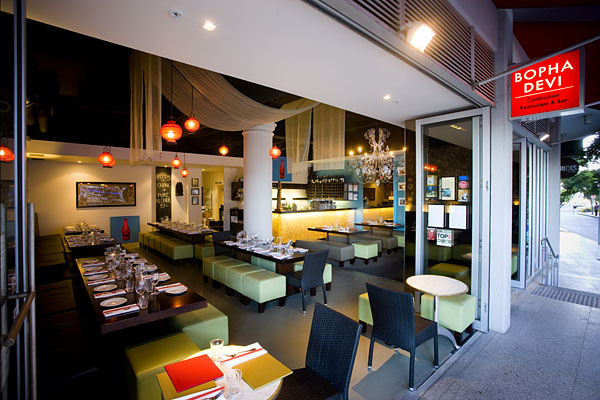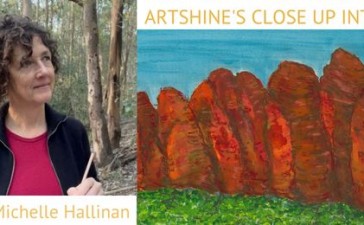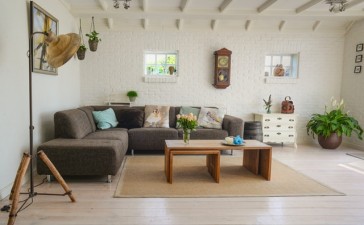Tell us about yourself and Bopha Devi?
I’m what you call an accidental restaurateur. I had a typical Asian-refugee upbringing in Australia where both parents worked in factories and being the eldest of three sons I had responsibility resting on my shoulders as soon as my youngest brother started prep school. I never played in the streets because the “Stop the Asian Invasion” posters were still drying on the pebble-mix bus shelters. So I stayed indoors watching ‘Happy Days’ and “I Dream of Jeanie” as a way of learning English and Western culture. Doing homework was always hard because my parents could never help me with finishing off proverbs such as, “Sticks and stones…” In my down time I would escape by tracing compulsively over superhero figures or build phallic monuments with Lego. If I were really bored I would flash English word cards at my brothers.
Refugee Camp, Thailand 1975
With an Accounting degree under my arm I realised that I should have been an architect. I never throw things, but one day I threw a pen across the room of the Finance department. It was a sign that I craved to express myself creatively. Still not knowing what to do with my life, I gave software support a go and it was during this period that my life turned upside down overnight. One is never ready for upheaval, especially after Pol Pot. So I listened hard to my soul and it told me one night to check out Yarraville, an unknown place to me. I did and a little shop had a “For Sale” sign. The next day I rang my mum and for no apparent reason my uncle took the day off to be with her. We inspected the shop and put a deposit that day. It was cheap and the area had potential.
When it came to naming the restaurant, both my mum and uncle went blank. At this sight I recalled a UNESCO greeting card that pictured the Cambodian Princess Bopha Devi performing a traditional Apsara dance. Dressed in white silk and gold ornaments the Princess evoked the golden age of Khmer culture. “You can’t name the restaurant after her,” my mum said. “The name is reserved for Royalty.” What does Bopha Devi mean I asked her? “Bopha means beautiful divine flower and Devi is goddess.” Ooh, lovely. I wanted to convey what the Princess represented: the Khmer heritage.
What inspire you to open Bopha Devi Cambodian Restaurant?
Bopha Devi was inspired by my need to give meaning to my life. At the time my life was in major crisis. My belief in both society and humanity was shattered. Yet I was determined to survive and turn that suffering into a creative expression of love for where I came from. Martin Luther King once said, “Darkness cannot drive out darkness, only light can do that. Hate cannot drive out hate, only love can do that.” So through the darkness of my life I used love to transform a neglected steel-shuttered shop into a bevel-windowed space where food that nourished me growing up can be shared with a new audience. I was no longer ashamed of where I came from. I wanted to put Cambodia on the food map and by doing so it gave me a purpose to wake up each morning.
What are the five words that people who know you would use to describe you?
Loyal, compassionate, kind, considerate and generous.
Who (or what) inspires you to do what you love as a cook and a restaurant owner?
My mother inspires me because she shows her love to her family and friends through food. In Khmer culture the first thing you ask a guest when they arrive at your home is, “Have you eaten?” Either way there is always food available for guests. A Cambodian will always cook more food than is required out of fear of not having enough food for the guest. Cooking for someone is showing that you love him or her. Whenever I visit my mother she is always cooking something for me.
Char Kroeung
Where do you get your inspiration from when you design the menu?
The inspiration behind my menu design is the preservation of Cambodian cooking. I realise that the knowledge base is limited mainly to the older generations of Cambodians. The younger ones in Australia either can’t or refuse to cook. They’re too busy with their modern life-style. Culturally, Cambodian identity may become extinct like other societies through out history if they do not preserve their heritage. With only a population of 15 million people, Thailand’s 68 million people and Vietnam’s 93 million people squeeze Cambodia in. This makes Khmer heritage precious and precarious.
What are the signature dishes in your restaurant?
The fish amok is our signature dish as it originates from the Angkor period. The Tonle Sap, which is the great fresh water lake near the temple city, produces an abundance of fish through out the year. The amok is a steamed coconut curry in a banana leaf cup.
What motivates you to do your best as the Restaurant owner?
I am motivated to be my best so that I can be an inspiration to younger Cambodians. Even though I am still healing myself, I am hopeful that my desire to help other people will demonstrate that humanity is still inherently good. Most Cambodians suffer from low self-esteem stemming from the post-traumatic stress disorder caused by the Khmer Rouge episode. Hundreds of years of cultural decline also deflates the national psyche. I want to remind young Cambodians that they should be proud of who they are. More importantly though, I want them to listen to their soul and pursue their dreams.
What are key tasks for Restaurant owner?
The key task required for me to move from an owner who works in the business to one that works on the business is to implement systems so that the restaurant can run without me.
Trei Char Kney
Where do you see yourself in five years?
I see myself having a long sabbatical where I finally can have some solitude to bring out to the world a story that has been nagging in me. There is a narrative black hole in Cambodian history that needs to be explored. The research and groundwork has been done over the last ten years, but stringing it all together while running a restaurant is challenging.
What do you most love about your job?
Meeting wonderful Australians who have a genuine love for Cambodia and its people. Their hearts have been touched and you can feel it in their energy. They make me feel grateful that I have created an environment where we can meet, eat and raise money through various fundraisers to help those less fortunate. Through my love for Cambodia I have attracted other people who show even more love.
If you had just one wish, what would it be?
I would like to become a time traveller and witness moments in history. My first stop would be Angkor at a time when it was the world’s largest city. I want to see it as a fully functioning society with food being prepared, religious processions taking place, watching elephant polo and warriors kick-bocking. And to listen to their stories…
Bopha Devi Docklands 27 Rakaia Way New Quay Docklands Vic 3008 Australia
How do you connect with other artisans, and your customers (i.e. how do you network)?
Having a restaurant allows me to meet a lot of interesting people. It’s a natural social gathering place. It’s inclusive of everyone. Over the last 14 years I have met a lot of talented people. Conversations are struck and connections are made. I like being constantly surprised by what people do and what drives them to fulfil their passions.
Best cooking tip for a novice just getting into the business?
Best ingredients at the best price.
What advice can you offer other artisans who are just starting out and following their passions?
Embrace what makes you different. What you thought was a curse is really a blessing. When I was in primary school I was ashamed that I was from Cambodia because of what I saw on the news. I was ashamed of the suffering and I was also ashamed of myself for lying about my nationality. Now, Cambodia is my point of difference. To redeem myself I want to give back to Cambodia.
Mouan Ang
What is your proudest moment so far?
My proudest moment so far has been the sale of the “Food for the Soul” cookbook, which has raised over $65,000 so far for an orphanage in Cambodia. The next goal for the orphanage is to build their own Children’s centre, which requires approximately $180,000 worth of book sales. This will mean 9000 books.
Who do you most want to meet and why?
I would like to meet Cambodia’s Princess Bopha Devi one day and ask her questions about her life, especially during her stay in Paris during the 1960’s and 1970’s. How did she fit into French society knowing that Cambodia was approaching upheaval and did she feel like an outsider and experienced racism? What sort of people did she meet and did she visit her younger brother who was studying music and ballet in Prague? I want to know her joys and her sufferings.
What is the most important lesson in life that you have learned?
I have learnt that giving unconditional love to your life and others really do ease life’s sufferings and allows you to become a truly creative being.
K’dom
Do you have a favourite cookbook to recommend?
My favourite cookbook is my first cookbook from Home Economics. I think it was called, “Cooking the Australian Way.” This made an impression on me because I wanted to assimilate. I had to assimilate. It took me into the Australian household where the browning of butter with diced onion seared into my senses. I learnt how to make scones, damper and Cornish pasties. The Australian culinary world was exotic to me.
Where do we find you and your restaurant?
Bopha Devi Docklands
27 Rakaia Way
New Quay
Docklands Vic 3008

